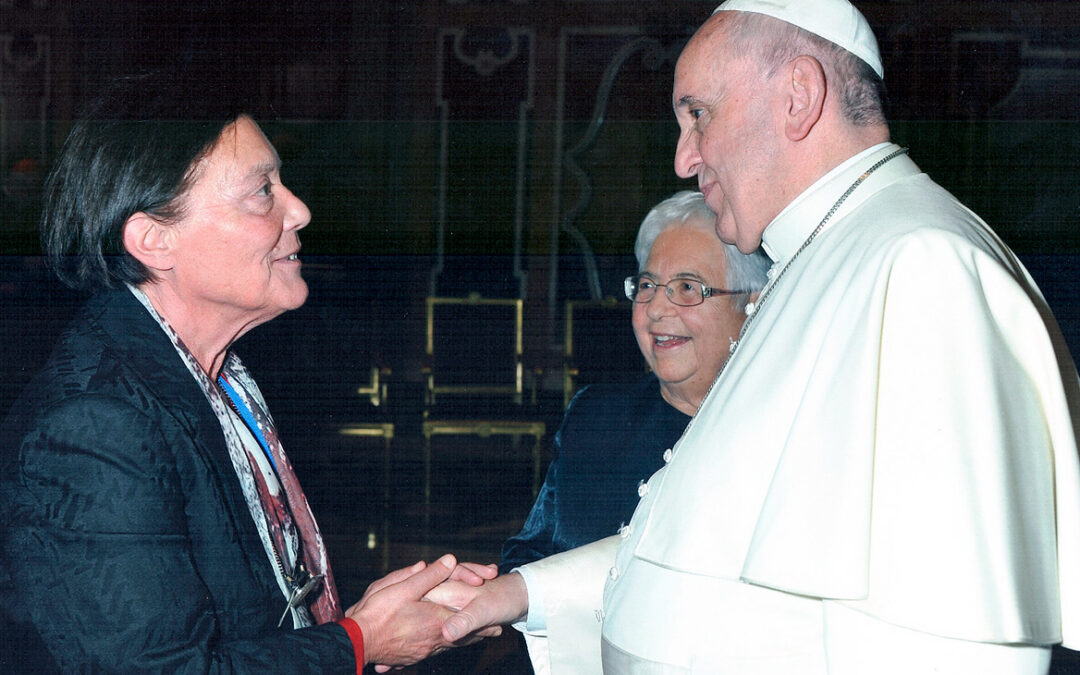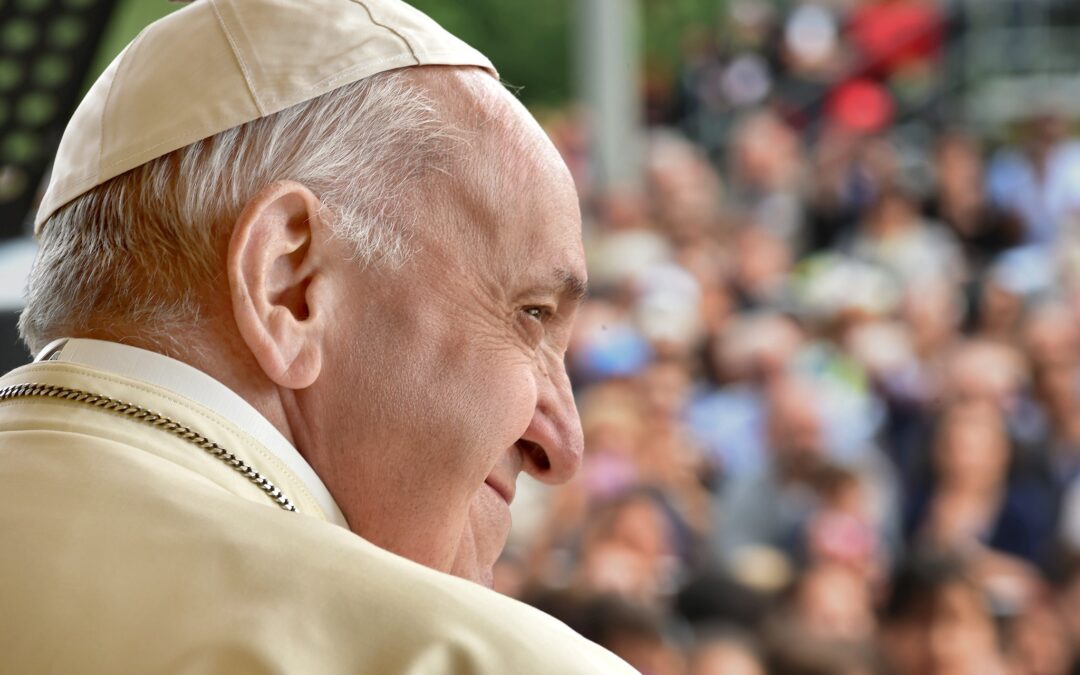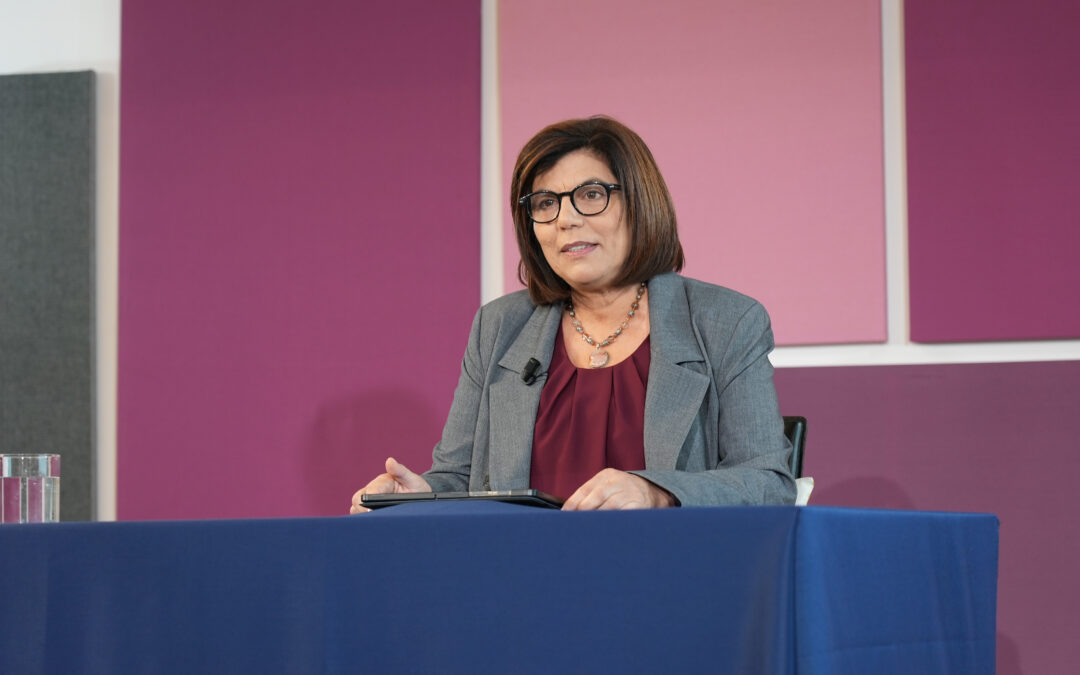
Mar 1, 2025 | Parola di Vita
Jesus had come down from the mountain where he had spent the night in prayer and then had chosen his apostles. When he reached a flat place, he began to preach to them, beginning with the proclamation of the Beatitudes.
Luke’s and Matthew’s gospels differ: in Luke’s text there are only four Beatitudes and they concern the poor, the hungry, the suffering and the afflicted, with the addition of as many admonitions against the rich, the satiated and the arrogant [1].
Jesus revealed God’s special love for the poor when he was in the synagogue at Nazareth [2] and, filled with the Spirit of the Lord, he proclaimed that his mission was to bring glad tidings to the poor, deliverance to the captives and freedom to the oppressed.
Jesus went on to exhort the disciples to love even their enemies;[3] a message that finds its ultimate inspiration in the behaviour of the heavenly Father: ‘Be merciful, as your Father is merciful’ (Lk 6:36).
This statement is also the starting point for what follows: ‘Do not judge and you will not be judged; do not condemn and you will not be condemned; forgive and you will be forgiven’ (Lk 6:37). Jesus then goes on to reprimand the listeners by using a deliberately disproportionate image:
Why do you look at the speck of sawdust in your brother’s eye and pay no attention to the plank in your own eye?’
Jesus truly knows our heart. How often in everyday life do we have the sad experience of finding it easy to harshly criticise other people for their errors and weaknesses without taking into account that in doing so, we attribute to ourselves a prerogative that belongs to God alone? The fact is that in order to ‘remove the plank’ from our own eye, we need that humility that comes from the realisation that we are sinners continually in need of God’s forgiveness. Only people who have the courage to notice their own ‘plank’ and what they personally need in order to change for the better, will be able to understand without judging or exaggerating, the frailties and weaknesses in themselves and in other people.
Nonetheless, Jesus does not invite us to close our eyes to what is happening around us and just let things run their course. He wants his followers to help each other as they progress along the path to a new life. The apostle Paul also frequently reminds us to show concern for and correct those who are idle and disruptive, to encourage the disheartened, to help the weak and to be patient with everyone [4]. Only love is capable of serving others this way.
Why do you look at the speck of sawdust in your brother’s eye and pay no attention to the plank in your own eye?’
How can we put this word of life into practice?
In addition to what has already been said, during this Lenten season we can ask Jesus to teach us to see others as he sees them, as God sees them. And God sees with the eyes of the heart because he always gazes upon us with love.
To help each other even more, we could restore a practice that was decisive for the first group of Focolare girls in Trent.
Chiara Lubich once told a group of Muslim friends, ’At the beginning, it was not always easy to love in a radical way. Even among us, dust could settle on our relationships and unity could weaken.
This happened, for example, when we became aware of the faults, the imperfections of others and we judged them and so our mutual love diminished. One day, we decided that we should try to counter this situation. We made an agreement among ourselves and called it a ‘pact of mercy’. We decided that every morning we would see the people we met – at home, at school, at work, etc. as new – new – not calling to mind their faults at all but covering everything with love. It was a strong and challenging commitment, made by all of us together, that helped us to always be the first to love, in imitation of the merciful God, who forgives and forgets.” [5]
Edited by Augusto Parody Reyes and the Word of Life Team
[1]Cf. Lk 6, 20-26
[2]Cf. Lk 4, 16-21
[3]Cf. Lc 6, 27-35
[4] Cf. 1 Ts 5, 14
[5] C. Lubich, “Love for Neighbour.” Conversation with Muslim Friends . Castel Gandolfo, 1 Nov 2002
©Photo- Yan Krukov-Pexels

Mar 1, 2025 | Idea of the Month, Testimonianze di Vita
It seems obvious that we are made to relate to other people: in fact, we could even say that our lives are intertwined by the relationships we make. However, we sometimes we risk spoiling the latter with our harsh or superficial judgements.
Throughout history, various images have become part of everyday language. Thus, in
ancient tradition we find a well-known expression that says: ‘Why do you look at the speck in your brother’s eye and not notice the plank in your own?’[1] Equally proverbial is the image of the two saddlebags: one in front of our eyes, filled with the faults of other people which we easily see, and the other on our backs, holding our own faults which we then struggle to recognise.[2] There is also a Chinese proverb that says, ‘Man is blind to his own faults but has eagle eyes for those of others.’
This does not mean that we should indiscriminately accept what other people do and just let events run their course. Faced with injustice, violence or oppression, we cannot close our eyes. We must commit ourselves to change and start by looking at ourselves and listening sincerely to our own consciences to discover what we need to improve. Only then can we ask ourselves how we can concretely help others by sometimes offering advice and correction.
Each one of us needs ‘another point of view’ that offers a perspective different from our
own, enriching our ‘truth’ and helping us to avoid self-referentiality and those errors of judgement that are part of our human nature.
The word “mercy” may seem old fashioned but it is rich with meaning relevant to today: we can be merciful first towards ourselves and then towards others too. In fact, only if we are able to accept and forgive our own limitations will we be able to welcome the weaknesses and mistakes of others. Indeed, when we realise that unconsciously we may be feeling superior and in a position to judge other people, it is vital that we are willing to take ‘the first step’ towards the other person to avoid damaging the relationship.
Chiara Lubich told a group of Muslims about her experience when she and her companions lived in a small house in Trent as they began their adventures at the start of the Movement. Not everything was simple and there were misunderstandings. “It was not always easy to love in aradical way […] “Dust” could settle on our relationships and unity could diminish. This happened, for example, when we became aware of the faults and imperfections of others and judged them, so our mutual love grew cold. One day, we decided we should try to counter this situation and we decided
to make a pact among ourselves and called it a ‘pact of mercy’. We decided that every morning we would see the people we met – at home, at school, at work, etc. – as new without calling to mind their faults but covering everything with love.” [3] his is a ‘method’ worth putting into practice in groups at work, in the family and in
communities of all kinds.
© Foto di Cottonbro studio – Pexels
THE IDEA OF THE MONTH is currently produced by the Focolare Movement’s “Centre for Dialogue with People of Non-religious Beliefs”. It is an initiative that began in 2014 in Uruguay to share with non-believing friends the values of the Word of Life, i.e. the phrase from Scripture that members of the Movement strive to put into practice in their daily lives. Currently, THE IDEA OF THE MONTH is translated into 12 languages and distributed in more than 25 countries, with adaptations of the text according to different cultural sensitivities. dialogue4unity.focolare.org
[1] (Lc 6,41)
[2] Esopo (μῦθοι) , Fedro (Fabulae)
[3] C. Lubich, L’amore al prossimo, Conversazione con gli amici musulmani, Castel Gandolfo, 1° novembre 2002. Cf. C. Lubich, L’Amore reciproco, Città Nuova, Roma 2013, pp. 89-90.

Feb 27, 2025 | Chiesa, Cultura, Testimonianze di Vita
Dear Pope Francis, you may not remember, but we met on 26th September, 2014, when you received a delegation from the Focolare Movement in a private audience. I was part of it, Luciana Scalacci from Abbadia San Salvatore, representing the non-religious cultures that also have a home in the Focolare. I am one of those people who, as Jesus Moran once told me, “helped Chiara Lubich to open new horizons for the charism of unity”. I am a non-believer who has received a great deal from the Movement.
On that extraordinary day, I had the privilege of exchanging a few words with you that I will never forget and that I recall here:
Luciana: “Your Holiness, when you took office as Bishop of Rome, I wrote you a letter, even though I knew that you probably wouldn’t read it with all the letters you receive, but it was important for me to send you my affection and my best wishes, because Your Holiness, I do not recognize myself in any religious faith, but for more than 20 years I have been part of the Focolare Movement, it gave me back the hope that it is still possible to build a united world.”
Pope: “Pray for me, but you are not a believer, you do not pray, so keep me in your thoughts, a lot, think of me, I need it”.
Luciana: “But Holiness, in my own way I do pray for you.”
Pope: “A secular prayer and you keep me very much in your thoughts, I need it”.
Luciana: “Holiness, stay healthy, with courage, with strength! The Catholic Church and the whole world need you. The Catholic Church needs you. ”
Pope: “Keep me in your thoughts and pray for me in a secular way”.
Now, dear Pope Francis, you are in a hospital bed and I am too. Both of us are facing the fragility of our humanity. I want to assure you that I continue to think about you and pray for you in a secular way. You pray for me in a Christian way.
Luciana Scalacci
(Source: Città Nuova– Photo: ©VaticanMedia)

Feb 24, 2025 | Centro internazionale, Chiesa
The President of the Focolare Movement, Margaret Karram, sent a message to Pope Francis assuring him of her affectionate closeness and fervent prayer.
She wrote, “May Mary envelop you with her maternal love and all the tenderness that you have always recommended that we should have for the good of every person next to us and every nation.”
She added, “I send you the embrace of everyone in the worldwide Focolare Movement who is praying and constantly offering up everything for you. We are infinitely grateful for your life completely given to God and given for the good of humanity.”
Photo: © Raffaelle Orefice–CSC Audiovisivi

Feb 24, 2025 | Centro internazionale, Margaret-Karram
Margaret, why did you choose “closeness” as the theme of the year for the Focolare Movement in 2025?
I asked myself what kind of world are we living in? And it seems to me that at this moment in time there is so much loneliness and so much indifference. And there is an escalation of violence, of wars that bring so much pain all over the world. Also, I’ve been thinking about the technology that has connected us in ways we never knew before, but at the same time it makes us more and more individualistic. In a world like this, I think closeness can be an antidote; an aid to overcoming these obstacles and curing these “ills” that make us distant from one another.
Where can we start?
I have been asking myself this question for months. It seems to me that we need to re-learn how to approach people, re-learn how to look at and treat everyone as brothers and sisters. I felt that first of all, I had to examine my own attitude. Are the people I approach everyday brothers, are they sisters to me? Or am I indifferent towards them or even consider them enemies? I asked myself many questions. I have found that sometimes I want to avoid a person, because maybe they will bother me or annoy me or want to say difficult things to me. Because of all this, my reflection on closeness that I presented to those responsible for the Focolare Movement in mid-November was entitled, “Who are you for me?”
Could you tell us some of the main ideas you developed under this title?
Gladly. I’ll mention four thoughts. The first closeness that our soul experiences is its contact with God. He himself connects with our neighbours also through us. The desire to love the other person is like a movement from God in me directed to God in the other.
A second thought: Closeness is dynamic. It requires that we be completely open, that is, welcoming people without reservation, entering into their way of seeing things. We are not mass-produced! Each of us is unique, with a different character, mindset, culture, life and history. Recognizing and respecting this, calls for stepping outside of our mental and personal patterns.
You were talking about a third aspect …
Yes. The third aspect I want to emphasize is that closeness does not necessarily coincide with being near, with being similar, with belonging to the same culture. The parable of the Good Samaritan (Luke 10:25-37) expresses this very well. I was struck by the attitude of the Samaritan: The man who had fallen among the robbers was a person unknown to him, he was even from another people. He was a person who was distant both in culture and tradition. However, the Samaritan made himself a neighbour. This is the key point for me. Everyone has their own dignity, above and beyond the people and culture they come from, or their character. The Samaritan did not approach just to see if this person was hurt and then turn away or, at the most call for help. He made himself a neighbour and took care of the person. The fourth aspect …
… would be …
… is to let ourselves be wounded. If closeness is to bear fruit, each of us must not be afraid and must allow ourselves to be wounded by the other.
And that means, allowing ourselves to be challenged, being open to questions to which we have no answers; being willing to show that we are vulnerable; presenting ourselves as perhaps weak and incapable. The effect of an attitude like this can be surprising. Just think that a nine-year-old boy wrote to me that for him, closeness means “lifting up the other person’s heart.” Is this not a wonderful effect of closeness? Lifting up the heart of the other.
What would change within the Focolare Movement if we live closeness well?
If we really live it well so many things will change. I wish, hope, and pray that they will. But I also want to point out that many people in the Focolare Movement are already living closeness. There are so many initiatives, many projects for peace and for helping the poor. We have even opened focolares to give assistance and welcome to immigrants or to care for the environment.
And what should change?
The quality of relationships between people. Sometimes it is easier to treat people outside the Movement well and it is more difficult among us who are part of the same family. We are in danger of living relationships of “good manners” with each other: We do not hurt each other; however, I wonder, is this an authentic relationship?
So, I hope that, beyond the projects, closeness becomes a daily way of life; that we ask ourselves several times during the day: Am I living this closeness? How am I living it? An important expression of closeness is forgiveness. To be merciful to others—and to ourselves.
What message does it contain for society?
Closeness is not only a religious or spiritual attitude, but also a civil and social one. It is possible to live it in any environment. In education for example or medicine, even in politics, where it is perhaps more difficult. If we live it well, we can have a positive influence on relationships wherever we are.
What about the Church?
The church exists because, with the coming of Jesus, God became close. So, the Church, the Churches are called to witness a lived closeness. Recently we had the Synod in the Catholic Church. I was able to attend the two sessions at the Vatican. There we were more than 300 people, each from a different culture. What did we do? An exercise in synodality, an exercise in listening, in getting to know one another deeply, in welcoming the other’s thinking, their challenges and pains. These are all characteristics of closeness.
The title of the Synod was “Walking Together.” This walking involved so many people all over the world. The logo of the Synod expressed the desire to broaden the tent of the Church so that no one feels excluded. It seems to me that this is the true sense of closeness, that no one is excluded; that everyone feels welcomed, whether it is those who attend the church, those who do not feel that they belong to it or those who have even drifted away for various reasons.
I would like to mention for a moment the limits of closeness. How can we live it well?
This is an important question. Are there limits to closeness? As a first answer I would say there should be no limits.
However?
We cannot be sure that what is closeness and solidarity for us or for me, is necessarily closeness and solidarity for the other person. And in a relationship, we can never lack respect for each other’s freedom and conscience. These two things are essential in every relationship. That is why it is important that when we approach a person, we will always do it in a delicate way, and not as something imposed. It is the other person who decides how much and what kind of closeness he or she wants.
We have a lot to learn, don’t we?
Absolutely. We have made quite a few mistakes. In thinking we are loving the other person, instead we have hurt them. In the rush to communicate our spirituality, we have built relationships in which the other person has not always felt free. Sometimes it seems to me that with the good intention of loving a person, we crushed them. We did not have enough delicacy and respect for the other’s conscience, the other’s freedom, the other’s time. And this has led to certain forms of paternalism and even abuse.
Certainly, this is a very painful situation that we are facing, and where the people we have hurt have a unique, a really unique importance. Because on our own we cannot fully understand what has happened. It is the one who has been hurt who helps us understand the mistakes we have made and to take the necessary steps so that these things don’t happen again.
A final wish?
I hope that this theme can bring us back to the essence of what Jesus himself gave us in the Gospel. He gave us so many examples of what it means to live closeness.
There is a thought of Chiara Lubich that resonated very strongly with me in thinking about this theme. She says, “There are those who do things ‘out of love,’ there are those who do things trying to ‘be Love.’ Love places us in God, and God is Love. But the Love that is God, is light, and with light we can see whether our way of approaching and serving our neighbour is in line with the Heart of God, as our neighbour would desire it, as they would dream it to be, if it wasn’t us next to them, but Jesus.”
Thank you, Margaret, from the bottom of my heart, for your passion for a closeness that is lived with decision and respect.
Peter Forst
(Published in the magazine Neu Stadt)
Photo: © Austin Im-CSC Audiovisivi





